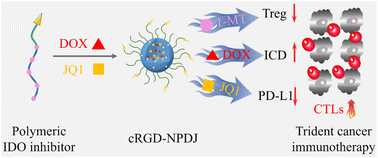A polymeric IDO inhibitor based on poly(ethylene glycol)-b-poly(l-tyrosine-co-1-methyl-d-tryptophan) enables facile trident cancer immunotherapy†
Abstract
Indoleamine 2,3-dioxygenase (IDO), with an immunoregulatory effect related to tryptophan metabolism, has emerged as an attractive target for cancer immunotherapy. Here, a polymeric IDO inhibitor based on the poly(ethylene glycol)-b-poly(L-tyrosine-co-1-methyl-D-tryptophan) copolymer (PEG-b-P(Tyr-co-1-MT)) was developed for facile trident cancer immunotherapy. PEG-b-P(Tyr-co-1-MT) could self-assemble into nanoparticles (NPs), which were subject to enzyme degradation and capable of retarding the metabolism of L-tryptophan (TRP) to L-kynurenine (KYN) in B16F10 cancer cells. Notably, cRGD-functionalized NPs showed efficient encapsulation and an enzyme-responsive release of doxorubicin (DOX) and the BET bromodomain inhibitor JQ1. DOX in drug-loaded nanoparticles (cRGD-NPDJ) could activate immunization by inducing the discernible immunogenic cell death (ICD) of cancer cells and promoting the secretion of interferon-γ (IFN-γ), which besides activating the antitumor cellular immunity often upregulates the expression of PD-L1 and IDO to accelerate tumor progression. The encapsulated JQ1 and polymeric 1-MT in cRGD-NPDJ could reverse the expression by disrupting the binding of BET proteins with chromatin and elevating the TRP/KYN ratio. In B16F10 tumor-bearing C57BL/6 mice, cRGD-NPDJ displayed significantly increased CD8+ T cells, matured dendritic cells (mDCs), and cytokines (IFN-γ, TNF-α), as well as reduced regulatory T cells and downregulated PD-L1 expression at tumor sites, generating immune cascade reactions and a distinct improvement of the tumor microenvironment (TME), leading to significant tumor suppression and survival prolongation. The polymeric IDO inhibitor provides a facile strategy for the co-delivery of chemotherapeutics and inhibitors for efficient and safe combination cancer immunotherapy.



 Please wait while we load your content...
Please wait while we load your content...